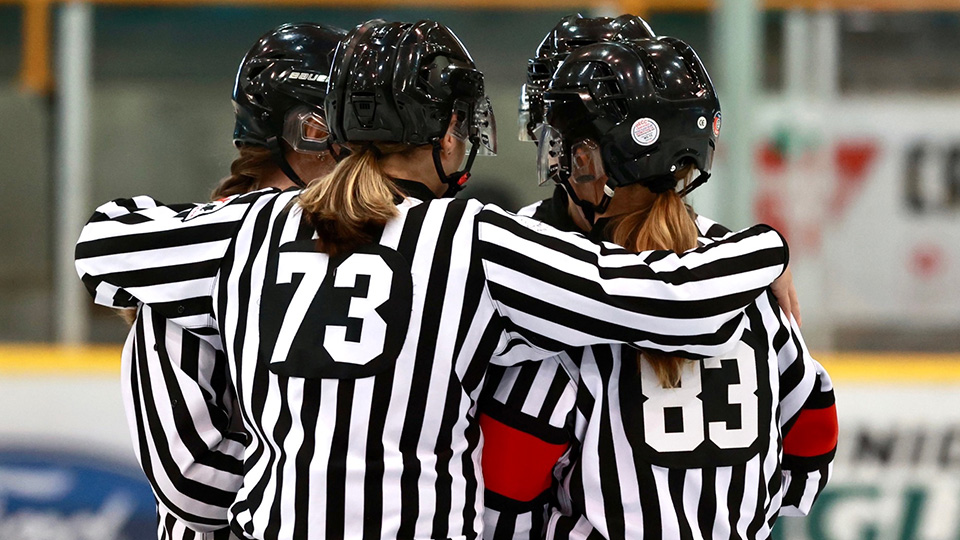Much like players, officials use high-profile events like the Esso Cup to showcase their skills
“Do you have Velcro on your butt?â€
As you can imagine, Lacey Senuk was slightly taken aback by the question.
Senuk had just finished refereeing a game at the 2011 Esso Cup in St. Albert, Alta., when Wally Popik, then the referee-in-chief for Hockey Alberta, offered her some invaluable if unconventional advice.
“He’s like ‘you’re stuck to the boards,’†says Senuk, laughing at the memory. “I stopped and thought, ‘you have a good point.’ Little positional tips like that are great learning tools.â€
Senuk was officiating her second Esso Cup, having called lines at the 2009 event in Calgary. Her name had been put forth by Hockey Alberta to work the events.
Hockey Canada relies on its provincial branches to monitor, evaluate and nominate officials for its national championships. If your name gets passed on, you know you’ve been doing a good job.
“In a way, we basically rubber stamp the branch’s nominations,†says Todd Anderson, senior manager of officiating for Hockey Canada.
In some cases, officials at the Esso Cup have already worked other high-profile events, including the Canada Winter Games and the National Women’s Under-18 Championship. For others, including Senuk in 2009, the tournament serves as a stepping stone to more national assignments.
The 2008-09 season was Senuk’s first as an official. She grew up playing hockey in Grand Cache, Alta., and joined the Notre Dame Hounds in Wilcox, Sask., for four years before eventually settling in St. Albert, where she continued to play recreational hockey.
“I had friends who were referees who said I should give it a try,†says Senuk. “I thought it would be one way I could give back to the game.†That first year officiating was also her last playing. “I realized quite quickly that I much prefer (refereeing) to playing.â€
Now Senuk, a safety adviser at an oil and gas company, skates up to five times a week, including calling multiple games on weekends.
The 2009 Esso Cup was her first big event. “It helped me develop my game and I got some wonderful feedback from the supervisor,†she says. It also put her on the national radar. She went on to call lines at the 2009 National Women’s Under-18 Championship and 2010 4 Nations Cup.
In 2011, she returned to the Esso Cup, her second event as a referee. “It gave me a little bit more intuition and feedback as to what they were looking for at the national level,†she says.
It also gave her the chance to officiate the preliminary round game between the St. Albert Slash and the Notre Dame Hounds – her hometown team versus her alma mater.
“I called a penalty shot because a St. Albert player covered the puck in the crease,†she remembers. The Slash coach got in her ear to double check with her crew. “It’s like, ‘nope, I was all of three feet from it and the call is what it is.’ I was like, ‘holy crap, we’re actually going to do this.’â€
An official’s performance gets monitored throughout the week by the event supervisors. “Much like the teams advance with earning their places in the final, the officials are competing within their group for the opportunity to be named for the final game,†says Anderson.
Senuk thought she’d had a good week in St. Albert. She’d felt good about her calls, received some great feedback from the officials and had tons of hometown support from the minor hockey community. When her name wasn’t called to work either of the semifinal games, she assumed her tournament was over.
“Then I found out I got the gold [medal game]. OK, then,†she says, laughing. “My tournament is not done. I still have a game to skate.â€
“They’re in a pretty elite group among championship officials,†says Anderson. “At the end of the day, there’s an internal competition among the referees for one to be named for the gold medal game.â€
“Although everyone is competing for that gold medal game,†adds Senuk, “we don’t bash each other down to take that step.†That very camaraderie of helping others succeed is one of the things Senuk enjoys most about being an official.
In the past three years, Senuk has gone on to work another National Women’s Under-18 Championship, the Canada Winter Games, CIS national championship, as well as IIHF events, including an Olympic pre-qualification event in China and an IIHF Ice Hockey Women’s World Championship qualifier in Mexico.
The immediate future sees her skating camps this summer to further hone her skills. And thanks to the experience and exposure she’s reaped from the Esso Cup and other national assignments, she hopes her not-too-distant future will bring her ultimate goal: calling games at the IIHF Women’s World Championship.



